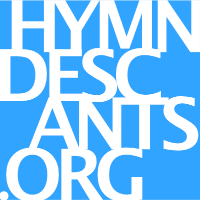1 harm. RVW
All creatures of our God and king
lift up your voice and with us sing
Alleluia, alleluia!
Bright burning sun with golden beam,
Pale silver moon with softer gleem,
O praise him, O praise him
Alleluia, alleluia, alleluia!
2. alt. harm.
Sweet flowing water pure and clear
make music for your Lord to hear:
Alleluia, alleluia!
Fire so intense and fiercely bright,
you give to us both warmth and light.
O praise him, O praise him
Alleluia, alleluia, alleluia!
3 a cappella
All you with mercy in your heart:
forgiving others do your part:
O sing now, alleluia!
All you that pain and sorrow bear
praise God and cast on him your care!
O praise him, O praise him
Alleluia, alleluia, alleluia!
4. descant
Let all things their creator bless,
and worship him in humbleness:
O praise him, alleluia!
Praise God the Father, praise the Son,
and praise the Spirit - Three in One.
O praise him, O praise him
Alleluia, alleluia, alleluia!
This tune was the setting for the Easter hymn, Lasst uns erfreuen herzlich sehr, which celebrates the resurrection narrative from the perspective of Mary. It first appeared in the Jesuit hymnal Ausserlesene Catholische Geistliche Kirchengesänge (Cologne, 1623, ed. Friedrich Spee), and the setting quickly produced variants regarding the distribution of the alleluias. German literature usually attributes authorship of both the text and the tune to the collection's editor. As a poet and hymnologist, the attribution to him of the text is plausible; however there are no first-hand references to support an assertion of composition. Moreover, opening phrase comes from a 1525 hymn tune, GENEVAN 68 / OLD 113TH .[1] Authoritative English language sources rarely cite the earlier provenance, although a thoroughly-researched discussion can be found on the Hymn Society of Great Britain and Ireland website.
Ye watchers and ye holy ones is a text of particularly Anglo-Catholic gravitas by Athelstan Riley which first appeared in the English Hymnal (1906). It was based on the 3rd C.Te deum and 4th C. Axion estin,2 a Greek hymn to Mary opening with familiar words to Anglican Book of Common Prayer, "It is truly meet..." The hymn All creatures of our God and King is a paraphrase of St. Francis' Cantico di frate sole, a 'laude' written not in Latin but in vernacular Italian; it is sometimes refered to as Canticle of the Sun.3 It was rendered into English verse by William Henry Draper (1855-1933) for a procession at a children’s festival prior to it's publication in The Public School Hymn Book (1919), and is one of the best loved hymn settings across many denominations. Despite erroneous attrubutions to others, the anonymous 9th C. Frankish office hymn, Aurora lucis rutilat became Light's glittering morn from John Mason Neale's prolific works of translation.4 It has been configured into three subsequent hymns, e.g., "That Easter day with joy was bright," and some thumb-puzzle reconfigurations into other versions.
References
1Daw, Carl P., Jr. Glory to God: A companion, Westminster John Knox Press, 2016 (Louisville KY), p.18.
2Axion estin, Wikipedia (retr. 2020)
3C. Michael Hawn, History of Hymns (UMC Discipleship Ministries): Saint Francis' "Canticle of the Sun" inspires 20th-century hymn
4Michael Martin, Aurora lucis rutliat, Thesaurus Precum Latinarum (website)
A congregational arrangement for two trumpets, two trombones, horn and timpani is available,including a Paschal version with the text from the 9th C. hymn, 'Light's glittering morn bedecks the sky.' It can be prepared with any text, and produced in US or A4 format. Link to audio demo of the brass version.
Ye watchers and ye holy ones
Both sets include harmonized descant score, and separate choir parts for the descant and ad lib a cappella verse.
All creatures of our God and King
Descant verse (The Hymnal 1982):
Let all things their Creator bless,
and worship Him in humbleness,
O praise him, Alleluia!
Praise God the Father, praise the Son,
And praise the Spirit, Three in One,
O praise him, O praise him, Alleluia, Alleluia, Alleluia!
– Francis of Assissi, adapt. William Draper.

